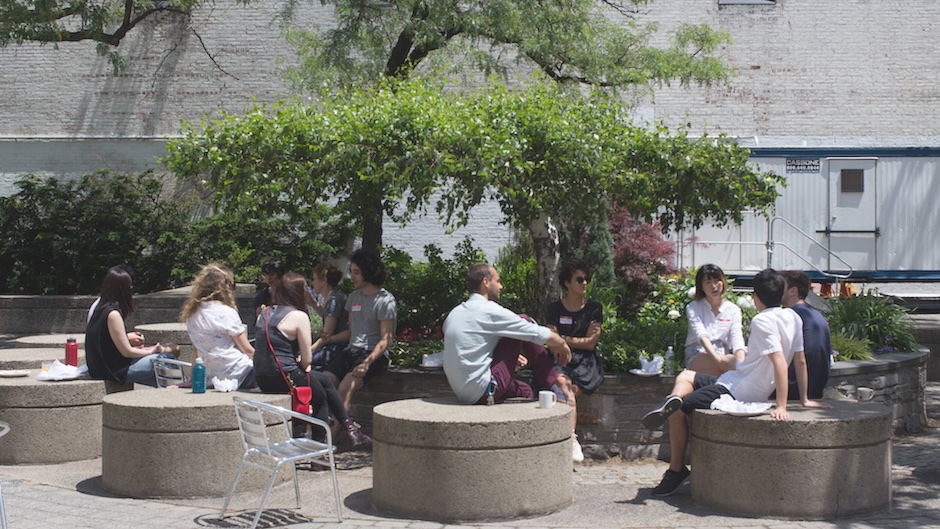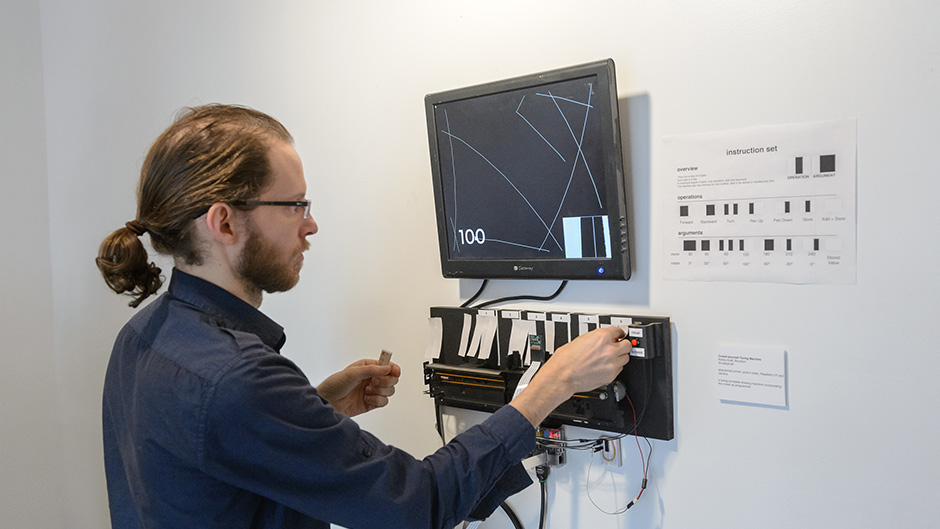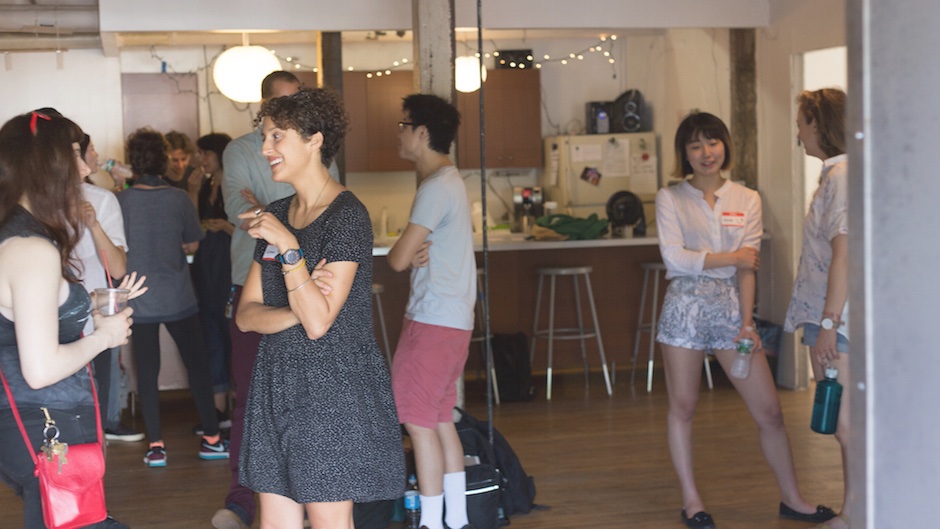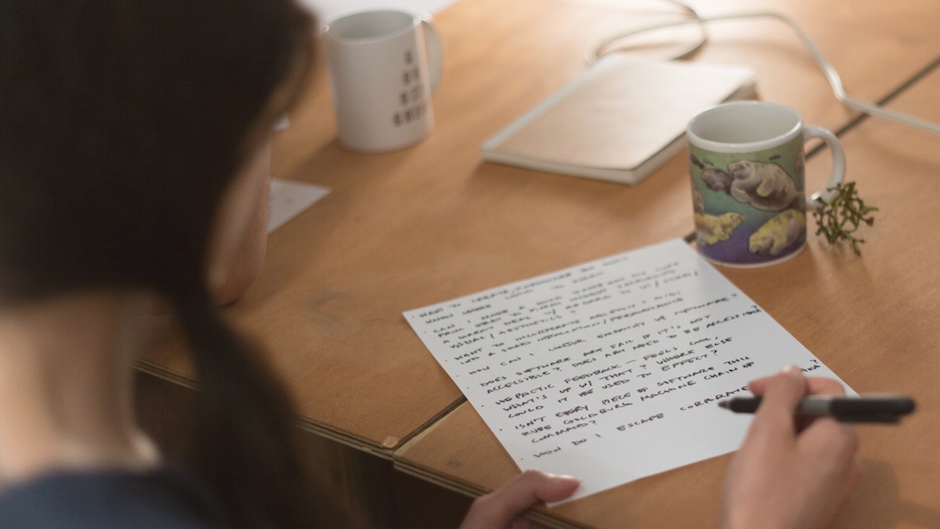Announced on November 13,2020
Thanks for your interest in SFPC. SFPC is working on internal organizing and planning for the future classes. We are not offering any classes in the fall of 2020. Please sign up to our mailing list to get an announcement about future events.
Past classes
Announced on April 27,2020
Due to the COVID-19 outbreaks, the School for Poetic Computation is offering classes for online, remote learning for the first time. Each class is lead by one of our core teachers. Apply now as the space is limited. Also, please support our fundraiser on GoFundMe to help us transition to online programs. We will announce summer/fall 2020 programs in mid-May. Sign up to our mailing list to get the latest updates. We will be announcing more short form workshops for spring/summer 2020.
Artist Statement: A User Guide (online)
Five weeks class by Celine Katzman between August 18 - September 15, 2020. This workshop offers a combination of practical writing and critical thinking skills. Enrollment is open to anyone including artists, designers, creative technologists, engineers, architects, and others whose practices are difficult to define. More information
Recreating the Past (online)
Ten weeks class by Zach Lieberman starting in May. Study computational art from the past decades and recreate these works with contemporary techniques to gain aesthetic, analytical and technical knowledge. More information
Dark Matters (online)
Ten weeks online class by American Artist starting in May. We will consider the racialized history of surveillance and the positioning of white as neutral within interfaces as forms of violence enacted through high technology. We will discuss in small groups, large discussions, and one-on-one how we all can use computational systems to create change while holding them accountable for their origins and biases. More information
Poetic Hardware (online)
Ten weeks class by CW&T starting in June. Learn computational hardware as a way to engage with the physical world and broaden our creative practices. Learn to make analog + digital electronics, a programmable micro-controller, sensors and mechanisms. More information
Digital Love Languages (online)
Ten weeks class by Melanie Hoff starting in June. Learn to cultivate code as a love language that can be gentle, healing, and intimate. This class is about building poetic tools for online communion through a re-introduction to computers and a call to action for expanding computation’s capacity for fostering interdependence and creative expression. More information
Teaching as Art (online)
Ten weeks online class by Taeyoon Choi starting in June. This class is for artists and technologists who want to teach. The class is also for teachers who want to advance their art and pedagogy. Students will learn about applying creative processes to teaching. Students will read about the history of artists in and out of academic institutions, Black Mountain College, Socially Engaged Art, as well as more recent experiments in Alternative Education. More information
Creative Coding Bootcamp (online)
A five session class taught over three weeks, next dates TBD. Students will be coding in C++, learning concepts like variables, memory, and scope; branching, looping, boolean evaluations, and logic; functions, recursion, and events; object-oriented design; and working with media like video, sound, and responding to keyboard and mouse inputs. Students will become competent in Xcode/Visual Studio, GitHub, and openFrameworks. This class is great for beginner coders who like to learn in a friendly, open environemt. Students are encouraged to ask questions and share their work. More information
Past programs
SFPC classes are typically structured around the following concepts: Computation and artistic practice, Language design as creative practice, Electronics and physical computing, Theory and philosophy for technology, and Code Poetry (Electronic literature and generatie poetry). The idea behind these interconnected topics is to build on SFPC’s core curriculum by exploring common ground where we can take the ideas developed in our classroom into the streets and studio. We offer a variety of programs including full time classes, short workshops, conferences and exhibitions. Here are some of our recent programs.
Critical Writing Workshop
One week class by Joanne McNeil. More information
Poetic Computation: 7 years of SFPC
The Poetic Computation: 7 years of SFPC was an exhibition at the Westbeth Gallery, NYC between January 11 - January 23, 2020. The exhibition, created with volunteer efforts, featured projects by our teachers and alums.
Code Movement
Led by movement teacher, performer, bodyworker, and writer Cori Kresge, this class will look at code as a resource, applying it to dance practices and community. We will focus on interpreting and creating systems of coding, scoring, and encrypting, using the body’s senses, gestures, and mechanics both individually and collectively. Together, we will cultivate practices that attempt to override the ego constructs that often obstruct or inhibit our learning and creativity. More information
Code Societies
Three weeks session organized by Melanie Hoff that challenged the division between those who code software and those who are coded by it. The session focused on creating a shared experience and a commitment to learning with care together. learn more.
2019
Fall 2019 Immersive 10-week program covering programming, electronics, and the history and theory of art and technology.
Poetic Computation: Detroit. 1 week session: August 19-25, 2019.
SFPC Summer 2019 in Yamaguchi 1 week session: September 4-11, 2019.
Spring 2019 March 4th - May 17th, 2019. Our immersive 10-week program covering programming, electronics, and the history and theory of art and technology.
Code Paper Scissors, a two-Week Session exploring the wide variety of ways that a piece of paper can produce function. Lead by paper engineer/designer Kelli Anderson and origami artist/developer Robby Kraft.
Code Societies Winter 2019 examines the ideological and corporeal attributes of computation; concentrating on the poetics and politics of culturally embedded software. How do different platforms and processes — including algorithms, data collection, social media, infrastructure, and interface — yield distinct modes of seeing, thinking, feeling, and reinforce existing systems of power? Through a balanced study of critical theory discussion and hands-on coding workshops, students will create small projects that explore and question these ideas.
2018
Code Ecologies December 15, 2018.
You Do (it) You(rself), Personal and Social Narratives of System Design in Electronic Arts December 8, 2018.
New York Tech Zine Fair December 1, 2018.
Code Words July 29 - August 3, 2018. A one-week session exploring how computation relates to language and art, focusing on literary art and poetry.
Code Societies July 2nd - Saturday July 21st, 2018. Code Societies examines the ideological and mythological attributes of computation, concentrating on the poetics and politics of culturally embedded software.
Uncomputable June 20th and June 28th, 2018. A series of lectures and exhibition by Alexander R. Galloway and Taeyoon Choi.
What is the School for Poetic Computation?
School for Poetic Computation (SFPC) is a hybrid of school, artist residency and research group where students develop a deep curiosity of what it means to work poetically in computational media. SFPC began as a school run by artists for artists. In the past we have held a combinations of two-week and ten-week intensive sessions.
SFPC is not a technical bootcamp, it is an opportunity to work with a group of faculty, visiting artists, and peers to focus on exploring artistic practice through computation. Computation is poetic when technology is used for critical thinking and aesthetic inquiry – a space where logic meets electricity (hardware), math meets language (software) and analytical thinking meets creative experimentation (theory).
This article featuring two teachers provides more insight on what teaching and learning feels like at SFPC or you can check out some of the student’s blogs from previous sessions: Yeseul, Chris, Andy, Sarah and Robby. Finally, our FAQ.
Who are we looking for?
We are looking for autodidacts from all backgrounds who are curious, generous and open. Anyone with a passion to explore poetic computation is invited and celebrate diversity in all forms. We expect that you are eager to experiment, learn from failure and come fully dedicated to this ten week experience meaning you will commit to engage with SFPC full-time.
In the past, we have had students with a broad array of technical experiences and we were delighted, though unsurprised, that everyone had something to learn from each other. A group of faculty leads a selection process that is based on applicant’s answers to an application form, work samples, and short interviews. Upon acceptance, a selection of reading and prep work will be assigned to you to complete prior to attending SFPC.
What is expected of me?
Acceptance into the session is an invitation to join the SFPC community. If you take our classes, we expect you to follow SFPC Code of Conduct. It’s also expected that you work openly – sharing what you learn along the way and collaborate with your peers. The success of the session for the group is dependent on engaged participation throughout the term. By participating you will be actively shaping an emerging culture of open source and transparent education.
What are classes like?
SFPC’s main program takes place over ten weeks in New York City with daily classes that range from programming, electronics, and the history and theory of art and technology. There are student-led skill sharing sessions, lectures and workshops with visiting artists, visits to institutions, schools, art spaces and dinners with special guests. Students have access to SFPC Slack to communicate with SFPC teachers and mentors who are readily available for technical, conceptual, and artistic guidance. Peer to peer collaboration is highly encouraged among participant. We celebrate with a final student showcase where students get to share their projects with the larger SFPC community.
How can I help SFPC?
You can support our fundraiser on GoFundMe. We are actively seeking private, corporate and institutional support to open our door to more diverse students. If you are interested in sponsoring a student, email info@sfpc.io. We are able to receive tax-deductible donations through our fiscal sponsor.
Where is SFPC?
We are located in 155 Bank Street, in the courtyard of the Westbeth Artists Community in the West Village, New York City.
Feel free to reach out to us if you have questions about the school: info@sfpc.io
SFPC is filled with amazing people and an open mindset to learning, and doing. It has taught me different ways of thinking, ones that I would be sure to bring back to my endeavors outside of the art world.
I'm half way through the program and I'm already missing being here. SFPC was a much needed breath of fresh air in my hectic creative existence, an unlikely place to stop and remind myself what was it I was into in the first place.
SFPC messed up my life a little bit. Actually, I think it's going to mess it up a lot. Before this program I thought I knew what I was doing and what the shape of my life was going to look like. Now I don't and each day I wake up scared I won't get to be a part of a community like this again. Everyday also now brings a fresh but welcome creative terror to overcome. Also I think I may have ended up moving to New York accidentally.
SFPC is the best place you can explore your interest as much as you want and the place you start to write your own poem.
SFPC is not really a school or a course — it is more like a door into an extraordinary world. It is driven by passion, kindness and the thrill of teaching and learning. I would love to live those inspiring weeks all over again.
SFPC was amazing — life-changing even — i want to do all this stuff for the rest of my life!
I've never been consistently surprised and inspired as much as at SFPC.
If you think SFPC is what you think, that will be wrong. SFPC is a space for a group of people who badly want to try something new. SFPC will become a spirit embedded in your blood which makes you think things with a different angle, just like its motto: more poetry, less demo.
I learned a lot at SFPC. It was only a 2 week program last time, but I learned many things from other participants and got the chance to explore and fail freely. SFPC helped me to reshape the way I think. It's your turn.
School For Poetic Computation is equal parts The Factory, childhood blanket fort, and mad scientist's lab. I learned a ton from the teachers and the whole SFPC community in a huge collaborative and exploratory environment.
Attending SFPC is like walking into an all day buffet supplied with food from hyper-talented chefs. There's more than you could ever consume, naturally, and you will most likely find yourself requiring a digestion period, but holy crap is it tasty.
My takeaway from SFPC: Never settle for code that isn't at least a little bit magic
In SFPC I found a great community and it gave me the confidence to take on coding projects I couldn't have done before.
SFPC is the purest, most honest exchange of knowledge and experience among peers I have ever experienced. It is a supportive space where everyone learns from everyone, and bridges are built that continue to be strengthened for years to come. You won’t get a certificate or a title at the end of it, but I would be amazed if you ever looked at your world the same again. I haven’t.




